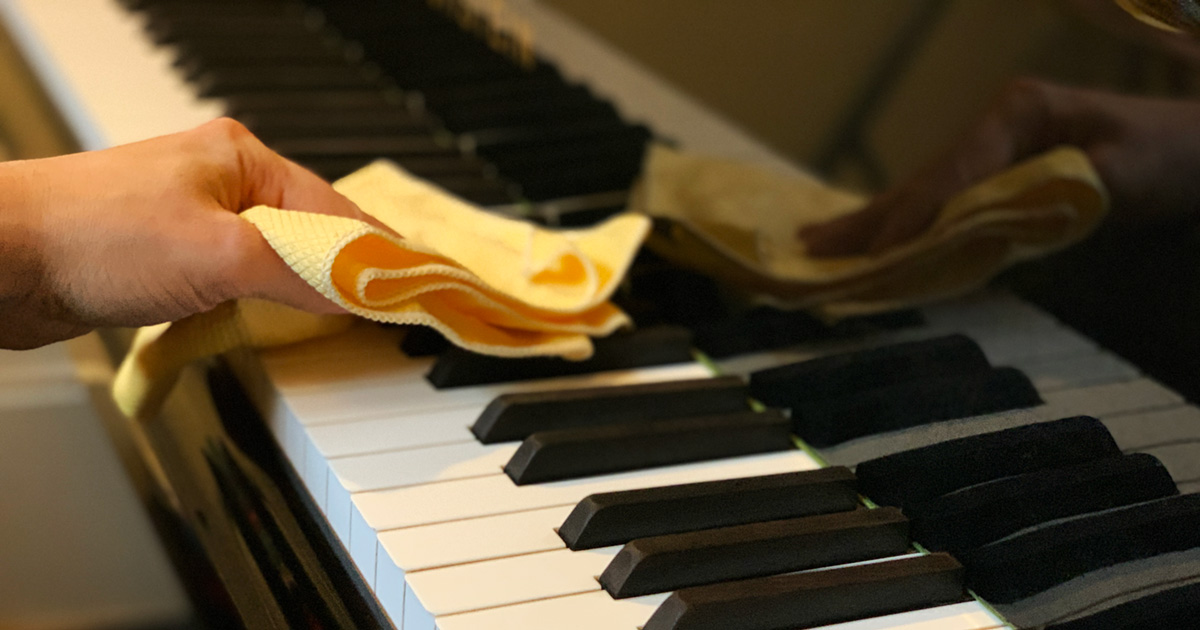Cleaning piano keys is essential for maintaining their look and feel. It also helps keep your instrument in top shape.
Dust, dirt, and oils from your fingers can build up over time on piano keys. This can make them sticky and discolored. Regular cleaning keeps your piano keys looking new and feeling smooth. It also helps prevent the spread of germs.
Whether you play daily or occasionally, clean keys provide a better playing experience. In this guide, you will learn simple steps to clean your piano keys safely. Let’s get started on making those keys shine!
Introduction To Piano Key Cleaning
Keeping your piano keys clean is crucial for their longevity. Dirty keys can affect the sound and feel of your instrument. Regular cleaning ensures a pleasant playing experience. In this post, we will guide you on how to clean piano keys effectively.
Importance Of Clean Keys
Clean keys help maintain the piano’s sound quality. Dirt and grime can build up on the keys over time. This buildup can make the keys sticky and hard to press. Clean keys are also more hygienic, reducing the spread of germs. Regular cleaning prevents long-term damage to the keys. This helps keep your piano looking new and well-maintained.
Common Cleaning Mistakes
Many people use harsh chemicals to clean piano keys. This can damage the keys’ surface. Avoid using products with bleach or ammonia. Using too much water can also harm the piano. Moisture can seep into the keys and cause warping. Always use a soft, dry cloth for cleaning. Be gentle to avoid scratching the keys.
Materials Needed
Cleaning piano keys requires a few basic materials. A soft cloth, mild soap, and distilled water are essential. Avoid harsh chemicals to protect the keys.
Cleaning your piano keys is essential to maintaining the instrument’s longevity and ensuring it looks as stunning as the music it produces. To get started, gather the necessary materials. Having the right supplies at hand will make the process easier and more effective.
Essential Cleaning Supplies
Begin by assembling the essential cleaning supplies. You’ll need a soft cloth, preferably microfiber, to avoid scratching the keys. A gentle cleaning solution is also important; you can use a mild soap mixed with water. If you’re using commercial products, ensure they’re safe for piano keys. Avoid harsh chemicals which can damage the finish. A clean, dry cloth is necessary for drying the keys after cleaning.
Choosing The Right Cloth
Selecting the right cloth is crucial. A microfiber cloth is ideal because it’s soft and non-abrasive. It effectively removes dust and fingerprints without scratching the keys. Avoid using paper towels or abrasive materials. They can cause micro-scratches that accumulate over time, dulling the keys’ appearance. Consider having separate cloths for cleaning and drying. This prevents any leftover moisture from causing damage. Have you ever cleaned your piano keys and noticed streaks? Using the right cloth can eliminate this issue and keep your piano looking pristine.
Preparing The Piano
Cleaning piano keys needs careful preparation. This ensures the keys stay safe from damage. Start by gathering the right tools. A soft cloth, mild soap, and water will do. Avoid harsh chemicals. They can harm the keys. Also, have a small vacuum ready. It helps with dust removal.
Removing Dust
First, remove dust from the keys. Use a soft, dry cloth. Microfiber works well. Gently wipe each key. Move from one end of the keyboard to the other. This avoids spreading dust around. For tight spaces, use a small vacuum with a brush attachment. Make sure the vacuum is on a low setting. This prevents any damage.
Protecting Surrounding Areas
Next, protect the surrounding areas of the piano. Cover the piano body with a cloth. This catches any cleaning solution drips. Also, keep the floor area around the piano clean. Place a towel or old sheet under the piano. This catches any falling dust or dirt. It also protects your floor from moisture.

Credit: www.youtube.com
Cleaning Ivory Keys
Cleaning piano keys gently with a soft cloth helps remove dirt. Use a small amount of mild soap and water. Avoid harsh chemicals to protect the ivory.
Cleaning ivory piano keys requires care and attention. Ivory is delicate and can be damaged easily. To keep the keys looking their best, use gentle cleaning solutions and proper drying techniques.
Gentle Cleaning Solutions
For ivory keys, avoid harsh chemicals. They can damage the surface. Use a soft cloth dampened with a mild soap and water solution. Wipe each key gently. Ensure the cloth is not too wet. Excess moisture can harm the ivory. Another option is using a mixture of white vinegar and water. Mix equal parts in a small bowl. Dip a soft cloth into the solution. Wipe the keys gently. This helps remove dirt and grime without damaging the keys.
Drying Techniques
After cleaning, it is crucial to dry the keys properly. Use a dry, soft cloth to wipe away any remaining moisture. Wipe each key individually. Ensure there is no excess water left on the surface. Allow the keys to air dry completely before closing the piano lid. This prevents moisture build-up. Proper drying helps maintain the integrity of the ivory and keeps your piano looking beautiful. “`
Cleaning Plastic Keys
Gently wipe piano keys with a soft cloth dampened with water and mild soap. Avoid excess moisture to prevent damage. Regular cleaning keeps keys looking new and playing smoothly.
Cleaning plastic piano keys can be straightforward. These keys are durable but still need care. Proper cleaning keeps them looking new and feeling smooth.
Safe Cleaning Products
Use mild dish soap for plastic keys. Mix a few drops with warm water. Avoid strong chemicals. They can damage the plastic. Use a soft cloth. Dampen it with the soapy water. Wipe each key gently. Ensure the cloth is not too wet. Too much water can seep into the keys. Rinse the cloth with clean water. Wipe the keys again to remove any soap residue.
Avoiding Damage
Never use abrasive cleaners on plastic keys. They can scratch the surface. Avoid using too much water. Always dry the keys with a soft, dry cloth. This prevents moisture buildup. Moisture can damage the keys over time. Keep the piano in a stable environment. Avoid extreme temperatures and humidity. This helps maintain the quality of the keys. “`
Deep Cleaning Methods
Deep cleaning your piano keys is vital to maintain their shine and performance. Regular cleaning may not always remove all the grime and stains. Deep cleaning ensures your piano keys look and feel like new. Let’s explore some effective deep cleaning methods.
Removing Stubborn Stains
Stubborn stains can ruin the appearance of your piano keys. To tackle these, prepare a solution of mild soap and warm water. Dip a soft cloth into the solution. Wring it out until it’s damp, not wet. Gently rub the stained keys. Focus on one key at a time.
For tougher stains, use a white vinyl eraser. Rub the eraser gently over the stain. Avoid colored erasers as they can leave marks. After erasing the stain, wipe the keys with a damp cloth. Dry them with a clean, soft cloth.
Polishing Keys
Polishing your piano keys restores their natural shine. Use a clean, soft cloth for polishing. A microfiber cloth works best. Dampen the cloth slightly with water. Wipe each key from back to front. This prevents dirt from getting pushed into the cracks.
For extra shine, use a small amount of white toothpaste. Apply it on a damp cloth. Gently polish each key. Rinse the cloth and wipe off any residue. Dry the keys immediately with a dry cloth. Avoid using harsh chemicals or abrasive materials. These can damage your piano keys.
Maintaining Clean Keys
Wipe piano keys with a damp cloth to remove dust. Use gentle soap and water for stubborn dirt. Dry thoroughly to prevent damage.
Cleaning piano keys is an essential part of maintaining your instrument. Clean keys not only look better but also function better. They can even help extend the life of your piano. Let’s dive into how to maintain clean keys with a regular cleaning routine and how to prevent future dirt.
Regular Cleaning Routine
A regular cleaning routine is key to keeping your piano keys in top condition. You don’t need fancy products to do the job. A soft cloth and some mild soap can work wonders. Start by dusting the keys with a microfiber cloth. This will remove any loose dirt or dust. Next, mix a small amount of mild soap with warm water. Dip a cloth in the soapy water, wring it out well, and gently wipe down each key. Be sure to use a separate cloth dipped in clean water to rinse off the soap. Dry the keys immediately with another clean, dry cloth to avoid any water damage.
Preventing Future Dirt
Preventing dirt from accumulating on your piano keys can save you a lot of cleaning effort. One of the best ways to do this is by washing your hands before playing. Clean hands mean cleaner keys. Another tip is to keep your piano covered when not in use. A dust cover can prevent dust and dirt from settling on the keys. Avoid eating or drinking near your piano. Spills can cause stains and sticky keys. Finally, consider a no-touch policy for curious little fingers. This can help keep the keys clean and in good condition. Do you have any other tips for maintaining clean piano keys? Share your thoughts in the comments below!

Credit: www.pianostreet.com
Professional Cleaning
Gently clean piano keys using a soft, damp cloth with mild soap. Avoid excess moisture to prevent damage. Wipe each key individually to ensure thorough cleaning.
Cleaning piano keys can be a meticulous job, and sometimes, it’s best to call in the professionals. While regular maintenance can be done at home, there are times when professional cleaning is necessary to ensure your piano keys remain in pristine condition. Let’s dive into when you should seek help and the benefits of professional cleaning services.
When To Seek Help
You might wonder when it’s time to call in the experts. If you notice persistent discoloration or sticky keys despite your best efforts, it’s a sign that professional intervention is needed. Deep stains from years of use or grime trapped in places you can’t reach with regular cleaning tools are also indicators. Professionals have the specialized tools and know-how to tackle these issues effectively. Regular professional cleaning, perhaps once a year, can also be a good preventive measure. This ensures that minor issues are addressed before they become significant problems.
Benefits Of Professional Service
Professional cleaning services bring several advantages. First, they use specialized cleaning agents that are safe for your piano’s materials. This ensures no damage to the keys or the finish. They also have the expertise to disassemble parts if needed. This means they can reach areas you can’t, ensuring a thorough clean. Moreover, having a professional take a look at your piano can help identify any underlying issues. Regular check-ups can extend the life of your piano, saving you money in the long run. Lastly, the convenience is unparalleled. You save time and effort, and you can trust that the job is done right. Imagine the peace of mind knowing your piano is in expert hands. Is it time for a professional to clean your piano keys? Consider these points and make the best choice for your instrument.

Credit: www.reddit.com
Frequently Asked Questions
How Do I Get My Piano Keys White Again?
Clean piano keys with a soft cloth and mild soap. Avoid harsh chemicals. Use white toothpaste for stubborn stains. Dry thoroughly.
What Is The Best Product To Clean Piano Keys?
The best product to clean piano keys is a mild soap solution. Use a damp cloth, not wet, to avoid damage. Dry keys immediately with a soft cloth.
Can You Use Rubbing Alcohol To Clean Piano Keys?
Yes, you can use rubbing alcohol to clean piano keys. Dampen a soft cloth with rubbing alcohol and gently wipe the keys. Avoid excessive moisture.
Can I Use Clorox Wipes On Piano Keys?
Using Clorox wipes on piano keys is not recommended. They can damage the finish and affect the keys’ performance. Use a damp cloth instead.
Conclusion
Cleaning piano keys is simple and essential for maintenance. Keep your instrument looking new and performing well. Use gentle cleaners and soft cloths for best results. Regular cleaning prevents buildup and keeps keys smooth. Enjoy playing on clean, bright keys.
A clean piano enhances your musical experience. Follow these tips and your piano will stay in top shape. Happy playing!
